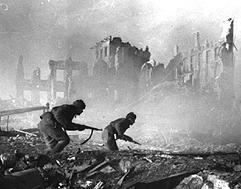
Presents a summary of:
DAYS AND NIGHTS
by
Konstantin Simonov
(1944)
1. A batallion of soldiers commanded by Captain Aleksei Ivanovich Saburov disembarks from a train in Elton, the last train station before Stalingrad, some 80 kilometers to the east. It is a barren, desolate steppe, seemingly the end of the earth.
An old barefoot woman, a recent refugee from Stalingrad, tells Saburov about how the city is burning, crumbling under bombardment. She doesn't talk of her personal misfortune, but one of her two sons has already died on the front and her husband and daughter--Ivan and Anya Klimenko--are still in Stalingrad. She wags her head, worrying about the money and labor that will be required to rebuild Stalingrad. Even in this dire moment, she--as are all Soviet citizens--is confident that the enemy will ultimately be repulsed.
One-third of Saburov's batallion is made up of men who fought with him at Voronezh. They have experience which makes them hard to kill.
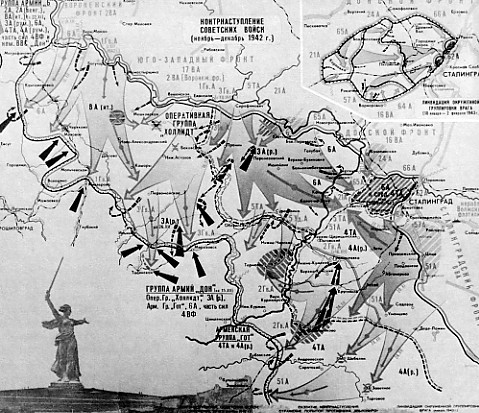 Saburov notices one soldier--a newcomer--standing guard as supplies are unloaded. This is Koniukov. He is no longer young, but nonetheless robust and has the unmistakable bearing of a soldier. It turns out that he fought in the the First World War.
Saburov notices one soldier--a newcomer--standing guard as supplies are unloaded. This is Koniukov. He is no longer young, but nonetheless robust and has the unmistakable bearing of a soldier. It turns out that he fought in the the First World War.A second train load of soldiers arrives. On board is the grouchy, never-satisfied regimental commander Lieutenant Colonel Filip Filipovich Babchenko. He orders Saburov to set out immediately for Stalingrad with his batallion.
2. Twenty days ago, on a sultry August day, the German assault on Stalingrad began. Observers counted 2,000 airplanes dropping bombs on the city that day. The city burned. Now it smells like ash, a smell which will remain throughout the long siege. The daily bombardment continues, beginning at 7:00 A.M. and lasting until sunset. Fires don't burn for very long any more for the simple reason that there's not much left to burn.
An impartial observer would say that the time has come to abandon the city. The ranks of the defenders--made up mainly of exhausted troops retreating from the Don--are woefully undermanned.
At the command post on Mamaev Kurgan, member of the military committee Major Matveev is poring over the map along with a General. Reminded that it is time to eat, Matveev and the General decide to dine outside in the warm evening breeze under the many lime trees, planted ten years ago by the Komsomol.
Word comes that contact has been made with the approaching reinforcements. Matveev and the General sigh with relief.
3. By 6:00 PM, Saburov's batallion reaches the banks of the Volga and prepares to cross. Colonel Bobrov, sent to meet and hurry up the reinforcements, sits to rest with Saburov on a log.
Saburov descends to the river and drinks the cool, clear water of the Mother Volga.
A barge towed by a small steamship arrives and starts unloading wounded soldiers. Saburov remarks that there are very few lightly wounded soldiers. Bobrov says there are plenty, but most stay in Stalingrad because the situation is so bad and their determination to defend the city is so fierce.
A crowd of people immediately begins a mad frenzy of pushing and shoving, trying to get on the barge for the return trip. One is carrying a barrel of vodka. They are acting as if the city were not aflame and under siege.
The soldiers get on the barge and steamship. Saburov kicks off all the civilians except for a select few, including the guy with the vodka and the nurse who had accompanied the wounded from Stalingrad.
As they sail back for Stalingrad, Saburov talks with the nurse, who is only 18 years old. She has made this trip many times. She had wanted to do so many things with her life--study, travel, love--but now she fears that she will die having done nothing. Saburov tries to reassure her.
As the steamship and barge approach the Stalingrad shore, German shells begin falling in the water around them. Saburov orders the men to remove their overcoats--to help prevent drowning in case they get tossed into the river. A shell hits the steamship, exploding. Saburov is knocked overboard into the water. He sees the nurse, who cannot swim, flailing about in the water near him. He grabs her and brings her back to the barge.
The barge makes it to shore. Lieutenant Maslennikov gravely reports that eight men are missing.
Saburov is surprised to near machine gun fire only 2 or 3 kilometers away.
4. By the time Saburov and his troops finish crossing the Volga, it is 10 PM and a fierce thunderstorm is lashing at them.
At midnight, Saburov is summoned to a meeting at divisional headquarters, which is located in a basement amid ruined buildings. The divisional commander is Colonel Protsenko, who fought with Saburov at Voronezh and was wounded there. A night attack is planned to dislodge the Germans from three buildings on the outskirts of the factory area where they managed to establish themselves during daylight. Saburov's troops are to stage the attack. Protsenko reminds Saburov that they must use surprise and decisiveness, not numbers...like at Voronezh.
The General, who until then had been standing by silently, questions Sauborv about his experience with street fighting and stresses that here in Stalingrad the commanders are always right at the front with their troops.
Saburov returns to his batallion and explains the situation. A senior lieutenant named Zhuk leads Saburov and his men by back alleys to the square which will be the front lines tonight.
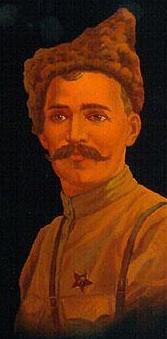 Chapaev read the detailed summary by  |
The attack begins. Company commander Gordenko (who looks like Chapaev), and political officer Parfenov are to attack the buildings on the right and left. Saburov himself will lead the assault directly across the square to the central building.
Saburov races forward, flops on the ground, and repeats this process time after time. Henceforth, time and life are measured only in meters. Russian and German mortars fire back and forth across the square, their exposions alternating with and merging with the crashing thunder.
Saburov's group makes it to the fountain in the center of the square--a stone child with its head blown off. They are only 100 meters away from the center building.
Under unrelenting machine-gun fire from the Germans, Saburov and his troops crawl forward. Saburov hopes that by drawing fire on his group, Gordenko and Parfenov will more easily be able to make their flanking maneuvers on the other two buildings.
Fear among the men is great, but the desire to get their hands on a damned German gives them the courage to go on.
They reach the walls of the building. Saburov tosses in a grenade, then he and his men leap in through the windows.
Saburov sprays the room with gunfire and hears the groans of dying Germans. He then kicks down a door and shoots more Germans in the hallway.
A confused running battle continues for about 30 minutes, Soviets and Germans dashing from room to room, floor to floor, firing and throwing grenades. By dawn, the three buildings are in Soviet hands. Saburov's group lost 21 men and captured 11 Germans. A telephone connection is established with the other two buildings, and Saburov learns that Parfenov is wounded.
Dodging gunfire, Saburov dashes across to the right building and comes to Parfenov, whose stomach has been ripped open by shrapnel. Young and inexperienced, never having learned to give orders properly, Parfenov bravely led his men into battle and now, gritting his teeth, he heroically dies.
Maslennikov brings up the rest of the battalion.
|
|
The Germans begin a counterattack. Protsenko joins Saburov at the observation post on the fourth floor. Shells nearly hit them several times. During a lull in the battle, Protsenko and Saburov start downstairs, but a shell smashes into the staircase, destroying an entire flight. They have to continue down by gripping the remnants of the railing.
After Protsenko departs, Saburov's orderly, Petya, brings him some cooked potatoes with lard. Saburov asks Petya where he got it, and Petya says he found a woman named Auntie Masha holed up in a basement in a wing of the building. She has three children, a goat, and a large store of food. Shocked to hear this, Saburov goes to see the woman. He tells her that as soon as possible they will evacuate her and her children to the other side of the Volga. Auntie Masha refuses to leave, saying her children would surely die if they left. Here in the basement they have a large store of food, which she promises to share with the soldiers. Saburov is troubled, but does not insist.
Gunfire rings out all night long, and in the morning, the Germans began another assault. Saburov gets a telephone call from Babchenko, telling him to hold on and promising that Babchenko himself will soon be there. Immediately after this, the telephone connection is cut, and the Germans encircle the buildings.
The battle rages for three days. Twice the Germans reach the walls of the building, but both times they are repelled. Nazi corpses lie in piles under the windows. Ammunition is running low. Saburov gives bullets only to those who are good shots. The rest get grenades.
 Shchi The perfect mid-battle snack. From russianfoods.com |
On the fourth day, Auntie Masha emerges from her basement and calmly, as if nothing is going on, brings Saburov a tasty bowl of shchi.
Saburov no longer knows what's going on elsewhere, although based on the cannon fire he assumes battles are raging all around. But one thing Saburov is sure of is that these three buildings are Russia. If he were to die or surrender, this little plot of ground would cease to be Russian and become German soil, something which he could not imagine.
On the next morning, Russian troops, led by Babchenko, break through the Germans and reach the buildings. Babchenko asks Saburov about losses. Saburov reports 53 dead and 145 wounded. Babchenko chides Saburov for not taking care of his men better, but nonetheless he praises Saburov for holding out.
Babchenko asks for some water, but then immediately falls asleep. Saburov looks at his watch. It is 9:15 AM--exactly four days and seven hours since he entered this building. And in all this time he has not slept.
6. Thereupon followed four more days of dive-bombing, shelling, machine-gunning, and beating back Nazi attacks. Only on the nineth day did a type of quiet come. As night falls, Saburov goes to sleep, but he is awakened by a pointless phone call from Babchenko.
Now unable to sleep, Saburov looks around the room that has become his headquarters and for the first time notices traces of the life of the people who used to live here. A child's school composition book, and childish drawings of fascists tanks burning, fascist planes crashing, and a lone Soviet fighter plane flying overhead. That's a child's impression of war: we only shoot, and the fascists only blow up and die. Sadly, Saburov notes to himself, prior to the war many adults shared this impression.
Like many of his contemporaries, Saburov was in some ways prepared for the war by the hardships and self-sacrifice of the first Five Year Plan.
Saburov started working as a child. Then, after service in the army, he spent his days and nights in the foundation pits of Magnitogorsk. Then, finally, he was able to enroll in the history faculty of Moscow University. In June 1941 he had just passed his first exams when Molotov's speech announced the war. Now, one year and three months later, having escaped encirlcement three times, having been decorated twice and wounded three times, this would-be history teacher finds himself in Stalingrad.
Maslennikov joins Saburov. He talks of his childhood and of love. Saburov realizes that he has never yet known love. He thinks, maybe he has not yet had love, but for him, surely, there will be love.
7. A short while later, Maslennikov reports that there were 18 men wounded during the night. A nurse has come to evacuate them. It is the nurse whom Saburov met on the ferry crossing the Volga. In fact, it has been this nurse who has evacuated most of the wounded.
Saburov invites the nurse to sit and eat something. As they talk, she says her name is Anya. Remembering his conversation with the old woman in Elton, Saburov asks her if her last name is Klimenko. It is. This is the daughter of that old woman. She inquires with concern about her mother, and Saburov tells her what he knows, which isn't much. She also says her father is still probably in the city, because he vowed not to leave.
Anya asks if they've found a guitar in the rubble, because she would like to play. Maslennikov promises to dig one up somewhere.
Anya pours out her feelings to Saburov, whom she views as a real adult who's been through a lot. She is a bit surprised when Saburov says he's only 29.
Saburov then lets the exhausted Anya fall asleep on his cot, promising to wake her at nightfall when she can escort out the wounded. Saburov has a strange feeling that Anya is now firmly connected to him and his future thoughts. When she leaves in the evening, he knows he will miss her.
8. The day begins with the usual German bombardment, only more fiece this time. Then more German attacks. Two Nazi tanks actually make it to the building courtyard before the Soviets are able to blow them up. During the fighting, Saburov is thrown against a wall by a powerful bomb blast, which dazes him, and he gets a grazing bullet wound on the arm. By night, the German managed to occupy the electrician's booth. However, Saburov launches a counterattack and retakes the booth.
Saburov and Maslennikov return to their headquarters-apartment for something to eat. A soldier named Vanin enters. He is to serve as Saburov's new commissar. Back in peacetime, Vanin served as secretary of the Stalingrad Komsomol. He talks with sadness of the destruction of the city. He helped plant the nearby trees (which are all destroyed) and make the volleyball court alongside these buildings. Saburov tells Vanin that the volleyball court has a few craters in it, but is still in good shape.
As they talk, Saburov says he's a bit angry with himself and others who perhaps spent too much time building parks, volleyball courts, etc., instead of preparing for war, which Saburov himself knew was inevitable.
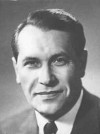 Beloved City (Liubimii Gorod) |
Saburov realizes that Anya is gone and asks where she went. Apparently, two hours ago a report came of groaning and cries for help coming from a strip of no-man's land between the Soviet and German positions. Assuming that a wounded soldier needed assistance, Anya insisted on going out there. She took a medical orderly with her, and Koniukov tagged along for safety.
Saburov is worried. Finally, the orderly and Koniukov return, dragging an obviously wounded Anya between them. Koniukov reports that they found Sergeant Panasiuk, who had not returned from a scouting mission yesterday and whom everyone assumed was dead. He wasn't dead, just gravely wounded and trying to crawl back to the Soviet position.
Koniukov, Anya, and the orderly started dragging Panasiuk toward the building. But the Germans opened fire and tossed grenades at them. Anya was wounded in the leg and had her head knocked against a rock. Panasiuk died, so Koniukov and the orderly left him and pulled Anya back to safety.
After Anya has her wounds bandaged, Saburov sits and talks with her a bit. Despite the fact that her face is covered with dirt and mud, Saburov notices for the first time that she is beautiful. He tells Anya that she must be sent back across the Volga with the other wounded. She asks only that Saburov remember her. As the streatcher-bearers start carrying Anya away, Saburov, seized by uncontrollable impulse, kisses Anya on her eyes and lips.
Saburov sits to write his daily report--a report that will be sent to Babchenko, then Protsenko, and on up the chain of command until it finally is made part of the daily summary placed on the desk of Stalin. Saburov feels that all of Russia stands with these three small buildings.
9. Things become relatively quiet around the buildings--in the Stalingrad sense of the term. There's the daily bombardment and German attacks--but they are not so fierce.
Saburov's headquarters apartment is destroyed, so he and most of the other troops move down to the basement, where they set themselves up rather comfortably. The radio operators set up a functioning post office, one soldier offers watch repairs, and Petya manages to fashion a crude bathtub. Even Babchenko comes to use the bath. Auntie Masha cooks for the soldiers, used to their presence and convinced that no one will try to make her leave.
On the eighth day, a fierce cannonade beings to the south. Fighting rages there, and the Germans break through to the Volga, effectively cutting the city in half.
Protsenko is on the phone with Matveev, who is at army headquarters in the southern section of the city. Matveev congratulates Protsenko, telling him that he's just been promoted to major-general. Then suddenly, the telephone link is cut.
To get his daily report to Army headquarters, Protsenko will have to send a messenger. He summons Saburov for the mission. While waiting for the report to be typed, Protsenko tells Saburov that he doesn't believe this will be the last war. Protsenko thinks there will be another war in 30-50 years (i.e., 1970s-1990s).
When the report is ready, Saburov crosses the Volga in a small boat, heads south, then crosses back over again. Saburov assumes that because of the German offensive, Army headquarters will have been moved. Instead, he finds it is still by the destroyed grain elevator, which is now less than a kilometer from the fighting.
Saburov finds the General and hands over the report. After reading it, the General notes that in times of crisis like this, it is vital to maintain a sense of calm, resolve, and firmness. And it was for this reason that the General forbade his staff to relocate headquarters, despite common sense.
10. When Saburov gets back to his building, a middle-aged reporter named Lopatin is there. Lopatin plans to spend a few days with the batallion, observing and talking to the troops.
Saburov and Lopatin have some vodka and talk. They note that in war people have become better--simpler, cleaner, smarter. Perhaps this is because they no longer have time for the countless petty details which confused their lives previously.
|
|
 Pelmeni Another perfect mid-battle snack. From russianfoods.com |
Saburov and Lopatin go to visit Koniukov, who is in a trench at the front of the building, with two machine gun nests. Saburov tells Lopatin that he has recommended Koniukov for a medal because of his brave work as a messenger between the companines during recent fighting. While Koniukov tells the story to Lopatin, Saburov goes to check other positions. Koniukov lets Lopatin fire the machine gun at the German positions. The Germans respond with several bazooka volleys, one of which knocks the cap right off Loptain's head.
As Saburov and Lopatin return to Potapov's bunker, a German bombardment of the position begins. Saburov counts at least 60 Nazi planes in the air above them. The period of calm has ended.
Saburov orders Potapov to take care of Lopatin and return him to Saburov's company when there is a break in the fighting. Saburov then runs from crater to crater to get back to his headquarters.
12. Fighting continues. After a day or so, Lopatin starts to leave, but has to return because he forgot his field pack. Remarking that to return to a place like this is bad luck, Lopatin leaves again and this time is wounded in the arm.
After five days of battle, Saburov wakes up and while deciding if he should shave or not, he breaks his mirror--another sign of bad luck.
An investigator shows up from division headquarters. Despite the fighting, he insists on interviewing a soldier named Stepanov. A kolkhoznik from near Penza, the 30-year-old Stepanov was in a trench yesterday evening, firing an antitank gun along with another soldier named Smyshlyaev. Stepanov fired at an approaching German tank and missed it, twice. The tank reached the trench. Smyshlyaev hurried after the tank and destroyed it with a grenade. By then, a second tank reached the trench and ran over Smyshlyaev, cutting him in half. Smyshlyaev's lower torso fell on Stepanov, who lost control of himself, abandoned his post and started crawling away, all the way to the Volga.
During questioning, the investigator realizes that while Stepanov is in fact a deserter, it was just due to shock...there was nothing premeditated about it. Stepanov says that after he composed himself, he would have returned by himself.
Suddenly, the Germans stage a major assault. Saburov orders everyone to the front lines. The no-longer-young investigator and the soldier guarding Stepanov order Stepanov to stay where he is, while they go join the battle. About 25 Germans make it over the wall and into the courtyard, but they are eventually beaten back. A lull ensues.
The investigator and the guard return. The investigator has a slight wound on his arm. Stepanov takes out a bandage, and he and the guard patch up the investigator. The investigator resumes his questioning of Stepanov, but they are interrupted by another assault. The investigator and the guard again leave Stepanov alone. The fighting is intense. After a few moment, Stepanov wanders out of the basement and into the trenches. He picks up the rifle of a dead soldier and starts shooting at the Germans. A German scales the trench, and Stepanov smashes him in the head with his rifle butt, and shoots and kills him. The German assault is turned back.
Stepanov sees that the investigator is seriously wounded in the leg. He picks up the investigator, carries him back to the basement, and summons a medic, who binds the wound. Saburov then comes and asks the investigator if he has made a conclusion on Stepanov's case. The investigator says the charges are to be dismissed.
The Germans mount a third attack. A few Germans and a tank manage to seize a fortified storage building on one side of the courtyard. Saburov decides to concentrate fire on the rear of the storage building so that no more Germans can reach it. Then, under cover of dark, Saburov plans to sneak up and retake the building, knowing that decisiveness and surprise can make up for their weakness in numbers.
Babchenko shows up, furious that Saburov hasn't immediately launched a counterattack, reminding him of the orders not to retreat a single step. Saburov tries to reason with Babchenko, but Babchenko still insists on an immediate attack.
Saburov takes 30 men and tries to advance on the storage building. Quickly, a third of the men are killed. The rest are pinned down, unable to advance. Brick fragments rip into half of Saburov's face, making him a bloody mess. Exploding shells make him nearly deaf. After about an hour of this hell, Saburov retreats with what's left of his contingent.
Babchenko realizes that the failed counterattack was his fault. But instead of admitting his mistake, he orders another assault which he will lead personally. He stands near the wall of the bunker, looking out and planning his route. German shells start landing closer and closer. Saburov shouts for Babchenko to move away. Babchenko, however, stubbornly stays put, rolls a cigarette and starts to smoke. Another shell explodes, only meters away. Sharpnel hits him in the head, killing him instantly.
Saburov, of course, is saddened by Babchenko's death. But at the same time he is relieved because he can call off this foolish attack and wait until nightfall as he has originally planned.
13. Saburov takes a nap. He wakes up to find Anya gazing down at him. Her wound is healed and she is back transporting wounded. She says that she's thought a lot about Saburov. It's obvious that they both regard that kiss on the stretcher as something important.
It begins to get dark, so Anya leaves to transport some wounded. She says she'll be back later for a second group. Saburov is eager to get his attack underway so he can get back and see Anya again. This lovelike feeling surprises him.
The night attack is a success. The storehouse is recaptured with only one casualty and five wounded.
Afterwards, Vanin, who helped build this part of the city, tells Saburov that the storehouse was used to warehouse scenery for the nearby theatre. Saburov comments on how well Vanin knows the city. Vanin boasts that he also knows the people. For example, he recognized Anya the nurse--she used to work in the tractor factory and they were going to recommend her for the Komsomol before the unpleasantness began.
Protsenko calls for a report on the attack. He is pleased with the results, but reprimands Saburov for the foolish daylight attack. Saburov can't bring himself to speak ill of the dead and lay blame where it belongs--on Babchenko. After all, good or bad, Babchenko died for Stalingrad, too.
A scout named Yusupov says he's found a way to sneak behind enemy lines during night. Saburov wants to check it out himself. At 11:00 P.M., Saburov, Yusupov, and a Corporal Petrov set off into the pitch black, drizzly night. They crawl between the ruins. It looks like an earthquake devastated the area--ruined buildings, smashed furniture, broken dishes, a bathtub, mangled samovars.
When they are about 100 meters from their goal, a plane appears overhead and starts dropping bombs. From a military point of view, the bombs are wasted, falling on no man's land. But for this reconnaissance group, the result is disasterous. Yusupov and Petrov are killed. A brick wall collapses on Saburov, completely immobilizing him. For the first time in the war, Saburov has a real fear of capture. So, despite the pain, despite the blood covering his face, despite the rain pelting down, Saburov struggles to move the bricks off himself, small piece by small piece, desparate to free himself before dawn.
This is the night of 12 October, Saburov's 30th day in Stalingrad.
14. Eight days later, Saburov is recovering in a village clinic. It is snowing outside. All is white and quiet--a welcome relief after the long noise of war. Saburov has no memory of how he got to the clinic, and none of the doctors know either. Anya arrives and fills him in on the details. Apparently Saburov managed somehow to free himself from the pile of bricks, but he collapsed unconscious on the way back. Worried about Saburov's prolonged absense, Maslennikov came out and found him.
|
ORDER OF THE RED STAR (Anya's Medal) 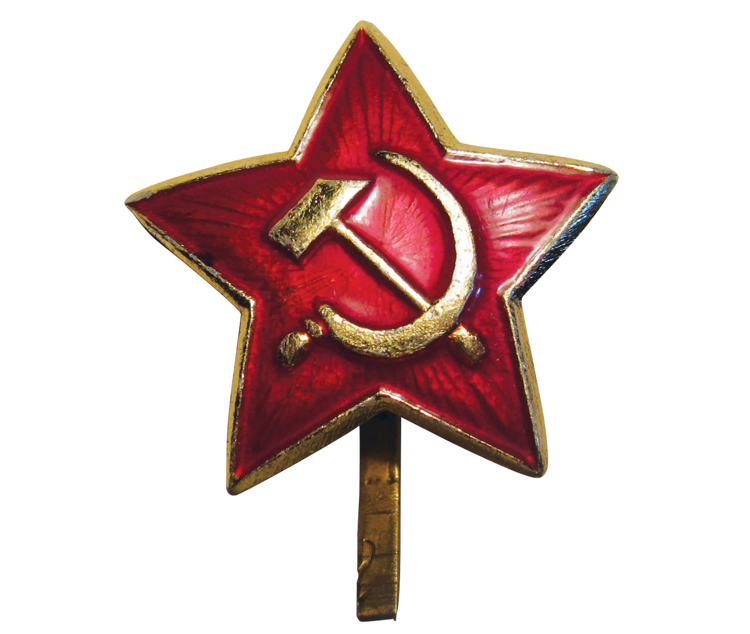 Instituted on 6 April 1930. Awarded to military personnel for: Personal courage and bravery in battle, excellent organization and capable combat leadership. Made of solid silver and red enamel. Current value on the open market: $20-$40 |
Anya has also been reunited with her mother, who is here in the village. She suggests that Saburov stay with her mother while he completes his recovery.
15. Saburov moves to the house with Anya and her mother, which is at the edge of the village, near trees and a river. Anya showers him with loving affection. They kiss and embrace. It is as if she instinctively knows where she can embrace him without hurting him. Every afternoon, Anya leaves to continue her duties evacuating the wounded. Saburov finds it difficult to sleep in her absence, worrying about her. He finds himself planning a wedding on the front lines, in his bunker.
After ten days of this almost-wedded bliss, in early November, it is time for Saburov to return to duty. In the morning, Saburov waits for Anya to return from Stalingrad, but she doesn't come. So, at 5 PM, Saburov sets out to that very same river crossing where he and Anya first met. And, sure enough, Anya is there, having just ferried across some wounded. Together, Anya and Saburov again cross the Volga and re-enter Stalingrad. As they reach the shore, they share a passionate kiss.
16. It is early November. Windy and bitingly cold. The Volga is starting to freeze over. The Germans have squeezed the Soviet forces close to the Volga...in spots one and a half kilometer away, elsewhere no more than a few hundred meters. Headquarters monitored fighting not within districts or streets, but individual buildings.
Army headquarters itself had to beat back Nazi attacks twice.
During his absence, the landscape of Stalingrad has changed greatly. The buildings he and his men are defending are no longer buildings--merely foundations with remnants of wall in places. All is ruble and metal--metal from the innumerable bombs. It seems as if the buildings have all gone underground and are covered over with burial mounds of bricks.
Vanin is somewhat depressed over their shortage of personnel. They still call themselves a batallion, even though they have only enough soldiers for a company.
Turning to happier subjects, Vanin insists that Saburov have his wedding immediately. If it is postponed until after the war, Vanin fears, they will go their separate ways and he'll never actually get to attend the wedding.
On the third day after his return, Saburov gets to see Anya for 10 minutes. They spend the time kissing and embracing in silence. The next day, he receives a note from Anya, saying she has been transfered to work with Remizov's regiment.
That same day, the Germans begin a fierce shelling and frontal assault against the entire division. Because the two opposing armies are so close together, the Germans don't risk aerial bombardment, but everything else they have they unleash on the Soviets.
The streets are so rubble-strewn that it is difficult for the German tanks to advance, but still they come--almost to the very houses Saburov's men are defending.
|
|
The Germans press the attack mainly against Remizov's regiment, trying to break through to the Volga. Saburov joins the first company. Maslennikov and two other soldiers take a machine gun and rush 40 meters forward to a piece of wall-and-staircase remnant. They mount the staircase to a window and open fire on the flank of the German forces that are pushing on Remizov. Seeing Maslennikov, the Germans start shelling his position, getting closer and closer.
Saburov order mortars brought up, and they begin firing on the German battery that's firing on Maslennikov. The Germans return the favor, directing their shells at the mortars. The mortar commander is killed, and Saburov assumes his duties. Saburov avoids death by centimeters as some shrapnel slices through this overcoat and shirt. Yet another explosion knocks him over and covers him with dirt, leaving an intense ringing in his ears.
The Germans finally destroy Maslennikov's machine gun, but he survives intact.
The Nazis manage to break through to the Volga, cutting off Saburov's position from Remizov's.
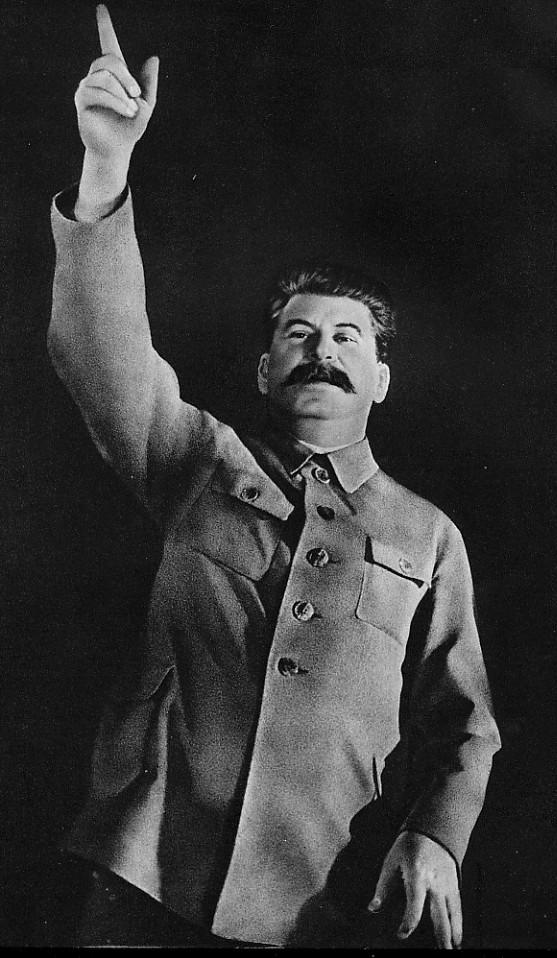 As the fighting dies down just before dark, Saburov lies on his back, looking up at the sky, and for the first time he notices that it is still snowing. The wet snowflakes have a pleasant, cooling effect on his face.
As the fighting dies down just before dark, Saburov lies on his back, looking up at the sky, and for the first time he notices that it is still snowing. The wet snowflakes have a pleasant, cooling effect on his face.17. Saburov joins Vanin in the command bunker. They each gulp down a glass of vodka. Weary, they turn on their radio. As luck would have it, just at that very moment Stalin is beginning a speech. Saburov remembers Stalin's first speech at the beginning of the war, in June 1941. More than Stalin's words, he remembers Stalin's voice--instead of its customary firmness, it was slow, filled with emotion and suffering. But today Stalin speaks more distinctly, calmly. Informed of everything that is going on, of every detail of the battle here--Stalin remains calm. One of Stalin's closing sentences makes a profound impression on Saburov: "Our second task is to exterminate the Hitler army and its leaders."
After the speech, inspired more by Stalin's tone than Stalin's words, Saburov turns to Vanin and says, "In the end, we will win." And Vanin agrees.
Maslennikov stumbles in, exhausted. He takes two puffs on a cigarette and falls asleep. Saburov says he intends to nominate Maslennikov as a Hero.
Saburov is summoned to see Protsenko.
18. As Suburov makes his way to division headquarters, he feels not just exhausted, but overcome with the weariness which settles on those who have been engaged in battle constantly for a year and a half.
Protsenko says they've lost all communication with Remizov's regiment. The Volga is covered with light ice, but hasn't completely frozen over yet; so it's impossible to get to Remizov by crossing the Volga, moving down river, then crossing back over. The only way to get there is to move along the shore of the river. The Germans are on the bluffs above, but haven't come down to the shoreline itself yet. Protsenko wants Saburov to make the trip tonight, see what the situation is with Remizov and take command if Remizov is dead.
The snow continues to fall in the darkness as Saburov starts to creep along the shore below the German-held bluffs. He moves silently, then stumbles against something and falls. The obstacle was a dead, frozen body. Obviously, his fall made a sound, because the Germans on the cliffs open fire. Saburov hides behind a log. The Germans mistake the corpse for a live intruder and spray it with machine gun fire, killing him a second time.
After the firing stops, Saburov continues crawling forward until he hears a sound. It is a German who has come down to the river for a bucket of water. Saburov hides behind a log until the German is right on top of him. Saburov grabs the German and pulls him down. The bucket of icy water spills all over Saburov. The German yells; they fight; Saburov manages to pull out his pistol and kill the German.
All hell breaks loose. The Germans rake the beach with gunfire. Saburov covers himself with the dead German for protection. The Soviets open fire from both sides. Saburov makes a break for it and reaches Remizov's regiment.
He is taken to Remizov, who has been wounded in the ass. Understandably, Remizov spends a great deal of time cursing.
Remizov informs Saburov about the situation in the regiment and advises that he and Protsenko mount a counterattack against the Germans tomorrow night, which was Protsenko's plan anyway.
Remizov assigns a soldier named Filipchuk to accompany Saburov back to Protsenko and return with any additional orders.
Before they set out, Saburov asks about Anya. Filipchuk saw her about 7 or 8 hours ago, and she was fine. Earlier, Remizov had given Anya a stern reprimand for taking too many risks. But he also nominated Anya for another medal.
The Germans are keeping the beach under constant fire, so Saburov and Filipchuk have to crawl the whole distance. Along the way, Filipchuk is wounded. Saburov drags him forward, but Filipchuk dies and Saburov is forced to leave the body behind.
ORDER OF LENIN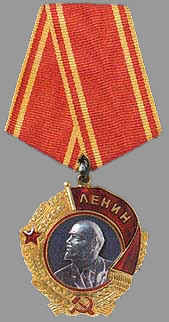 The USSR's highest award. Awarded to individuals and collectives for outstanding services to the revolutionary movement, outstanding achievements in labor activity, distinguished service in defense of the socialist homeland, in promoting friendship and cooperation between peoples and in strengthening peace, and other meritorious services to the Soviet state and society. |
Saburov salutes and leaves. Protsenko thinks that if Saburov makes it through, he'll nominate Saburov for the Order of Lenin--and if the authorities don't approve the nomination, Protsenko will take the Order of Lenin off his own chest and give it to Saburov.
Dawn is not far off, and the ground is completely frozen as Saburov starts to crawl across the beach. For some unknown reason, the Germans are no longer firing down from the cliffs. It's so quiet that Saburov starts to suspect a trap. He gets ready to drop a hand grenade at his own feet and kill himself if necessary to keep the Germans from finding the orders he carries. However, Saburov makes it all the way to the other side without a single shot being fired.
Saburov delivers the orders to Remizov, then they fire a volley of tracers over the river--the agreed-on signal to let Protsenko know the message got through.
Saburov gets ready to crawl back again, but Remizov refuses to allow him to tempt fate a fouth time. Saburov protests, saying he's left his batallion without a commander. Remizov says Saburov can return after tomorrow night's battle.
19. Saburov falls asleep and doesn't wake up until three o'clock in the afternoon. The cook, a young girl named Pasha, feeds Saburov but complains that because the river can't be crossed, they are extremely low on supplies. If the river doesn't freeze over, soon they will have no food.
Saburov joins Remizov at his forward observation post. The ground is covered with snow. The Germans have been busy attacking and bombing Protsenko's position. But the Germans have made no move against Remizov's regiment.
Remizov asks Saburov to go to the right flank and check up on Galyshev, a young lieutenant just out of the military academy who, because of all the casualties, suddenly finds himself in command of a battalion.
Saburov gets there and finds that, while Galyshev is indeed young, he seems to have things in order.
Anya shows up. She is stunned but very happy to see Saburov. She reminds him of his promise to have her assigned as nurse to his battalion so that they can be together. Saburov says he'll ask Protsenko just as soon as he returns.
Anya is working with the wounded, who are being kept in a nearby ravine, since it's impossible to cross over the thin ice of the river.
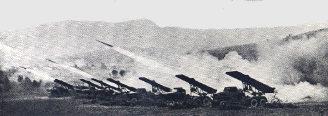 After nightfall, Saburov rejoins Remizov. At 10 PM, from the other side of the Volga begins a barrage of Soviet Katyusha rockets, followed by Soviet artillery. The troops then begin their assault. After several hours of fierce fighting, the Germans are dislodged and the Soviet troops reoccupy their trenches. Saburov is almost blown up a couple times and gets a bullet hole in his shirt.
After nightfall, Saburov rejoins Remizov. At 10 PM, from the other side of the Volga begins a barrage of Soviet Katyusha rockets, followed by Soviet artillery. The troops then begin their assault. After several hours of fierce fighting, the Germans are dislodged and the Soviet troops reoccupy their trenches. Saburov is almost blown up a couple times and gets a bullet hole in his shirt.Taking charge of one section of the trenches, Saburov knows that the Germans don't like night fighting and are probably waiting for dawn to launch their counterattack. Remizov's chief of staff, Annensky, sends up a few reiforcements with antitank guns.
20. At eight in the morning, the Germans begin hitting the Soviet trenches with artrillery and aerial bombarment. Then the German troops attack. The so-called ravine of death in front of the Soviet trenches lives up to its name, quickly filling up with dead and dying Germans. The attack lasts for two hours, but is beaten back.
Upset by the Soviet stubborness, the German again shell and bomb them for five and a half hours. This is followed by another assault over the ravine of death, which again is unsuccessful.
For a third time the Germans strafe and bomb the Soviets. The Germans use every type of bomb they possess--ones that dig deep before exploding; ones that explode on the surface; and those that explode above ground, raining down shrapnel. But by seven o'clock in the evening, when the assault ceases, the Soviets are still in place.
At the beginning of the day, Saburov had 82 soldiers under his command. At the end of the day, he has only 35, most of whom are lightly wonded. Saburov feels that today they did not just beat back the Germans; rather, they defeated the Germans, proving stronger than them.
Saburov is summoned to Protsenko. In an official tone, Protsenko announces that he's nominated Saburov for the Order of Lenin.
Protsenko then relays some bad news. For the attack, Protsenko had pulled away some men from Saburov's battalion, and, as a result, one of the three houses he was defending has been lost back to the Germans.
Protsenko has learned that Saburov has gotten married. Saburov admits it. Protsenko himself suggests that Anya be assigned to his battalion, but only on the condition that Protsenko is invited to the wedding banquet. Protsenko then advises Saburov that Anya is to restrict herself to medical duties. Often, out of the goodness of their hearts, women interfere in men's business. In wartime, however, Protsenko says, this cannot be permitted. Saburov agrees.
21. Saburov goes back to his batallion headquarters, where he is happily greated by Petya. On the left flank, the German are now only 60 meters away. Petya gives the casualty report, including the news that Auntie Masha and all her children were killed by a bomb.
Saburov steps into the bunker where Vanin is asleep at the table. In front of him is his unfinished political report, the last completed sentence of which reads: "There have been no negative occurences of moral-political behavior." When awakened, Vanin is very happy to see Saburov. He proudly shows off the stove they have added to the bunker, keeping things nice and warm. Maslennikov is forward at one of the houses, which is now under the command of Koniukov--everyone else senior has been killed. In effect, this house is surrounded by the Germans, and it can only be reached by crawling under the cover of darkness.
Saburov, inspired by yesterday's events, has an uncharacteristic optimism and talks about the time when they will retake the entire street.
Vanin walks with a limp, the result of a new wound.
|
|
Petya, a bit tipsy because he has been conserving food, talks rhapsodically about his plans for after the war. He will again work as a supply agent, being able to scrounge up anything--even oysters. Saburov sadly thinks of all the unfulfilled dreams of those who have died in the war and he feels their weight resting on his shoulders and the shoulders of all those who survive.
Vanin says he's fallen asleep three times writing his political report. Saburov jokingly says it's because Vanin's reports are so boring.
Saburov leaves to check out the positions. Maslennikov falls immediately asleep. Vanin ponders his political report and thinks perhaps instead of the standard report, he should report on those conversations, thoughts, feelings, and events which have struck him as interesting from a human perspective and which he has been noting in his personal diary.
Anya enters, reporting for duty. Vanin is happy to see her. He recalls aloud how earlier Saburov chided those like Vanin who, before the war, were too preoccupied with planting trees, having sports parades, and giving pretty speeches instead of learning to shoot and preparing for war. Vanin says Saburov is right. But Vanin defends himself, saying he did what he did in an effort to make people happy. And after the war, Vanin goes on, they will again plant the trees just like before.
Maslennikov wakes up and greets Anya like someone whose arrival has long been awaited. To make conversation, he says he read in Pravda about the movies showing in Moscow. Anya remembers seeing "The Three Musketeers" with Douglas Fairbanks and Mary Pickford when she was young. She reacts with great sadness when Maslennikov informs her that Fairbanks, Pickford, and Buster Keaton are all dead. Vanin says that Buster Keaton is still alive; but Maslennikov insists he is dead, so Vanin lets the matter drop and goes out to check on things.
Maslennikov insists that Anya lie down, and she does. He rolls her a cigarette and, even though she doesn't smoke, she accepts it, knowing this will please Maslennikov. Then she falls asleep. Maslennikov is happy to be protecting Saburov's wife. He dreams of surviving the war and finding love for himself.
22. Saburov and Petya crawl over to Koniukov's house. Koniukov has everything in a very organized and disciplined condition. They are cooking some potatoes which they found in Auntie Masha's basement.
The Germans launch an attack on the building. The battle lasts for an hour, then the Germans go away.
It is already starting to get light when Saburov and Petya try to crawl back to batallion headquarters. But the Germans see them and open fire on them. So Saburov decides he'll have to spend the day in Koniukov's house.
The day is mostly quiet, but in the late afternoon, the Germans make an attack on the batallion headquarters. Koniukov's house is well situated, because from here, they can fire on the flank of the attackers.
At exactly four PM, the Germans breach the batallion headquarters. Saburov hears a series of grenade explosions and becomes worried. For the first time in the war he is in danger of losing self-control. He pushes Koniukov away from the machine gun and himself mows down Germans, who retreat back to their positions, having failed to win control of battlion headquarters.
What happaned at the command bunker was this: Maslennikov and a few soldiers are there with Anya, who is bandaging a wounded soldier. The first German grenade lobbed into the bunker kills the soldier Anya is bandaging. She picks up his rifle and starts firing along with the other soldiers, although she doesn't really see what she's shooting at. Another grenade lands on the ground between Anya and a soldier. She picks up the grenade, intending to throw it back at the Germans. It explodes in her hand.
After the Germans are repulsed, Maslennikov notices Anya lying motionless on the ground, barely breathing. He phones for medical help. A doctor arrives and bandages the wounds on Anya's chest and shoulder. He says shes needs an operation and orders her evacuated immediately.
23. After dark, Saburov makes it back to the bunker. Maslennikov gives him the bad news about Anya. At first, Saburov seems to have no reaction. But a short while later, while going through the things in Anya's bag, he breaks down and cries.
The Volga has finally frozen over, so two stretcher bearers are carrying Anya across the ice to the other side. A German plane starts bombing, breaking up the ice. The stretcher bearers make it to an island. From there, Anya will be transferred the rest of the way across the river in a sleigh.
|
in our streets!  Comrade Stalin's Speech of 7 Nov. 1942 enigmatically promising the liberation of Stalingrad |
That same night, Matveev visits the division commanders, including Protsenko. He asks Protsenko how he interprets Stalin's remarks on the celebration in their streets. Guessing at the meaning of this hint, Protsenko says that the celebration will come by February, otherwise Stalin would have waited until his scheduled speech in February to make the promise. Matveev shares this interpretation. And with a nudge-nudge-wink-wink Matveev comments that they must hold out until then.
Protsenko summons all the regimental and battalion commanders to his bunker. Because the river is frozen over, Protsenko has fresh supplies of food and vodka, which are laid out on the table. He tells the commanders that he has gathered them not to discuss strategy and tactics, but just so that they can look one another in the eye and remember this moment. Perhaps they individually will not survive until that bright hour, but the division will survive. He offers a toast to the promise that soon there will be a holiday on our streets.
The men then hungrily dig into the food. Protsenko is jolly, making jokes. Everyone understands that Protsenko knows something to give him confidence in the future.
Protsenko mentally takes stock of his commanders. He knows that if the need arises, Saburov will be the next promoted to regimental command.
As the party breaks up, Protsenko reminds Saburov of the importance of surviving until that bright hour. Protsenko plans to duck his head more in the trenches, and advises Saburov to do the same.
Protsenko says he's heard of what happened to Anya and he will try to find out where she is. Saburov thanks Protsenko and leaves, forgetting to offically ask for permission first.
25. There are not so many men left in Saburov's battalion, so he speaks to each one individually, trying to convey to them the sense of something good about to happen which he got from Protsenko.
The Germans keep up their daily attacks and bombing, but in a seemingly rushed and unsystematic way, as if knowing that if they don't take their objective today, tomorrow will be to late. To Saburov it seems like the final convulsions of a seriously wounded animal. This pleases Saburov, even though he constantly carries with him his depression over the fate of Anya.
If Anya dies, Saburov feels that he will never love again.
On the fourth day, Saburov gets medals for Koniukov and members of his garrison. Saburov crawls over to Koniukov's house and--what a surprise!--everyone who is to get a medal is still alive, although Koniukov's left hand has been wounded by a piece of shrapnel.
After the distribution of the medals, Koniukov suggests that when the time comes to retake the third house, it would be best to attack the Germans directly from his house.
Saburov goes back to the command bunker and has a smoke with Maslennikov. Maslennikov mentions that it is the 18th of November. Saburov remembers that today is his 30th birthday.
At 6 AM, Saburov is awakened by a phone call from Protsenko, who orders him to go outside and listen. Saburov goes outside, where it is cold and a heavy snow is falling. At first, he doesn't hear anything, then he picks up a roar from the north--artillery fire and shooting 35-40 kilometers away. Saburov excitedly wakes up Maslennikov and Vanin and tells them to listen, too. Saburov orders Petya to break out the vodka and they drink a toast to the new offensive.
|
|
Protsenko promises medals to the first man to enter the house and to the first man to capture a German alive. He'll also give another medal to Koniukov for first suggesting the idea.
26. While Saburov and the others prepare for the night assault, the day proceeds normally at Koniukov's house--constant shooting and a few minor attacks by the Germans which are turned back.
Three cannon are brought up, so that they can be carried to the third house as soon as it is captured.
Under cover of darkness, Saburov and the troops, in small groups, crawl to Koniukov's house. At 12:45 AM, Soviet bazookas and mortars open fire on the third house. Saburov leads the troops forward. Taken by surprise, the Germans are quickly overcome and the Soviets reoccupy the house.
The German commanders are much vexed. Contrary to their usual dislike of night operations, they immediately launch a counterassault. The Soviets remain firm. Then the enemy comes a second time.
Saburov and Maslennikov are ambushed by a group of Germans who find a crack in the wall and burst in on them. Saburov mows some down, then his gun runs out of bullets. Maslennikov tosses a grenade, which does not explode. Saburov uses his rifle butt to club a German. Saburov loses his footing and falls down. This fall saves his life, because a stream of machine gun bullets cuts the air where only a second ago he was standing.
A German aims a rifle down at Saburov, on the verge of executing him. Maslennikov flings himself on the German, and they roll around on the ground, punching and strangling each other. The German manages to take out a pistol and shoot Maslennikov in the chest.
Saburov pulls an ammunition clip off his belt and uses it to smash the skull of Maslennikov's murderer.
Soviet soldiers come to Saburov's aid. The German attack is beaten back.
Much distressed, Saburov picks up Maslennikov. With the lifeless body in his arms, Saburov pauses to give orders about the placement of cannons. He then carries Maslennikov down to the basement and lays him on the pavement floor. For the second time in five days, Saburov cries.
The Germans attack a third time, but again the Soviets maintain possession of the house.
His voice filled with emotion, Saburov orders that Maslennikov be buried right here in the center of the house. Sapers use explosives to blast open the concrete floor. They dig a hole and lay Maslennikov out in it. Saburov jumps down into the pit. He takes Maslennikov's papers and the Order of the Red Star off the dead man's chest. He covers Maslennikov with his overcoat, so that only his face is seen.
|
the battle for Stalingrad  Visit Stalingrad.net |
Saburov orders that everyone fire a round in the air as a tribute. Saburov then turns his back and walks away as the sapers fill in the grave. He returns to business, giving orders about machine gun placement. For a time, all is quiet, with neither side shooting. The icy wind carries to Saburov the sound of the cannonade coming from the west, the new front.
Fifty kilometers away, Anya is lying unconscious in a hospital. She has already undergone one operation, but a piece of shrapnel is still lodged deep inside her. She is being prepared for a second operation. There is no guarantee that this operation will succeed, but one doctor comments, "If her heart holds out, she will survive."
On this snowy night, two new fronts, like two hands, continue squeezing in on the hundreds of thousands of Germans and their machinery around Stalingrad. A new happiness has begun for Russia.
|
Simonov, Konstantin Mikhailovich. Born on 18 November 1915 (28 November, Old Style). His father was a teacher at a military academy. Later, the family moved to Ryazan then Saratov. After completing his basic education, in 1930 Simonov entered the factory school in Saratov for training as a turner. In 1931 his family moved to Moscow, where Simonov began his working career as a factory mechanic. Around this same time he began writing poetry. . . . .(...Continued...) |
